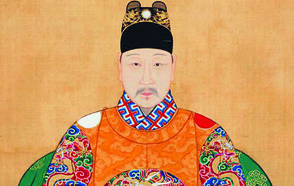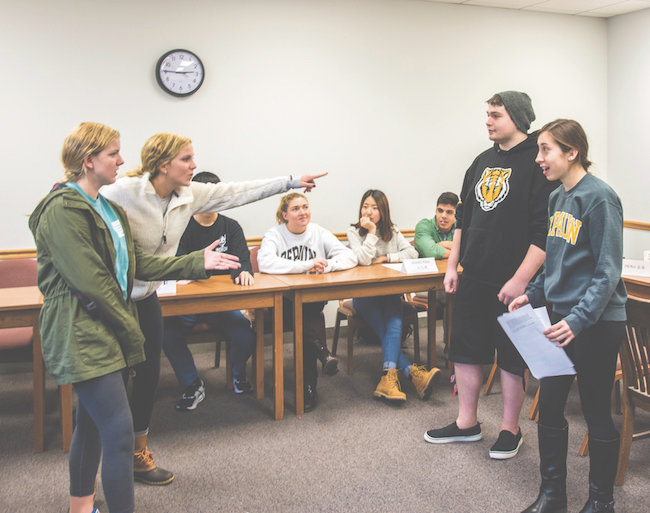Learning from the Past

April 19, 2016
The deliberations lasted a month. Wanli, emperor of China, had listened patiently to the advice of the imperial academy as each member made a case for who the next emperor should be. All voices had been heard. The Confucianists, dyed-in-the-wool purists, maintained that choice had already been made: Wanli should follow tradition and select the eldest son. Others in the emperor’s sphere of influence were more flexible in their beliefs. Perhaps the first-born son was the traditional choice, but was he the right one? Only the emperor – not the past – had the power to select an heir.
The First Grand Secretary, Wanli’s right-hand man, welcomed members of the royal academy as they filed before the emperor for what would be the last time. Wanli, her Pi Beta Phi shirt peeking out from a hooded sweatshirt that reached down to knee-high boots, sat nearby in silent indifference. Her expression was unchanged by the importance of what was to follow. Now was the time for decision.
Fall semester was nearly over.
Associate Professor of Modern Languages Sherry J. Mou teaches many courses about China’s culture, literature and language. This class, however, is very different from most. It’s not just a class, but also a game -- a role-playing game.
For the first months of the semester, Mou’s course is indistinguishable from the kind found on every college campus. Her students begin by learning about Chinese culture in a structured setting with lectures and readings, but it is all in preparation for the final 10 sessions when the game takes place. After learning how history unfolded, her students relive it. They become actors in the drama they have studied, presenting arguments from their characters’ perspectives while navigating the social order and politics of a 17th-century Chinese imperial court. Finally, the emperor chooses a successor. There are no guarantees that history will repeat.
Reacting to the Past
Role-playing is no longer limited to entertainment for chip-munching adolescents in their parents’ basements. As a tool, it can be very effective. The military relies on role-playing for field exercises, therapists use it in group sessions and corporations rely on it for team building. Sometimes it has been too effective -- such was the case in Philip Zimbardo’s Stanford prison experiment. The college classroom is no stranger to role-playing, either. Students are frequently asked to don the hats of roles they wish to pursue, whether in simulated business games or dry runs for young teachers. Less frequently, however, students are asked to take on entire personas.

Confucianism and the Succession Crisis of the Wanli Emperor, the game played by Mou’s class, is but one of many classroom games in the Reacting to the Past series developed by experts in their fields. There are no dragons or wizards to be found in these game books. No, the settings in these games are real, and the conflicts historical: the birth of democracy in Athens, Henry VIII’s divided parliament, the trial of Galileo. Created in the 1990s by Mark Carnes, a professor at Barnard College, Reacting has since grown from a classroom experiment into a national pedagogical movement. Hundreds of colleges and universities now use the games developed and curated by the Reacting to the Past Consortium, a national body representing 43 different institutions, from tiny liberal arts colleges to state universities. Adopters such as Mou are firm believers in the system. It’s different, it’s slightly unorthodox -- but it gets results from her students.
Though a game can be “won” by a player or faction, losing doesn’t mean failure in the course. On the contrary, of a student’s final grade, only a very small portion represents the outcome. “It is more important that a student ends the game understanding the main philosophical issues in history than to succeed at manipulating the outcome of the game,” Mou says. “A student having great influence over the outcome is a good thing. It is rewarding for me as a teacher to see that happen. But learning the culture that engendered the history is the goal.”
What’s my motivation?
Role-playing does not come easy for many people. Social anxiety can be a barrier, especially when surrounded by peers. And, despite having a long history and many serious applications, role-playing still isn’t exactly fashionable. Some of this natural apprehension was audible as students left their first game session in early November. To paraphrase a few of the mumbles: “What the heck is this?”
Mou and the creators of RTTP games understand this reaction. Though students have a sometimes disorienting degree of freedom in their choices, there is a structure that governs how the game is played. Mou’s students received dossiers with descriptions of their characters’ beliefs, as well as agendas that remain hidden to other players. While a hard-line Confucianist’s preferred outcome in Wanli’s succession would be plainly transparent, the other players might not know that exile or execution – a possibility, should the emperor deem it appropriate – could earn that player bonus points; martyrdom might be the character’s true motivation.
Anachronistic choices can also turn into teachable moments. A player who wants to do something ahistorical or not fitting within the scope of the character might approach Mou, the game master, beforehand to discuss options. Or the student can act unilaterally and force Mou to step in. The game master always has final authority over whether the student can proceed – and, if so, with what consequences.
The flipside is also true: some students don’t need added motivation to play their part convincingly. Yufei Han ’17, who portrayed Wanli in Mou’s class, is especially adept in her role as emperor. When unsolicited chatter breaks out between members of the academy, Han leans toward Adam Bridges ’17, the First Grand Secretary, to whisper something in his ear. The offending parties often fall silent even before Bridges issues a reprimand or asks for an explanation.
In past Reacting courses Mou has taught, classroom drama has on occasion bled into real-world email negotiations. Mou’s only expectation is that students keep their exchanges civil. “Students sometimes get very passionate,” Mou says, grinning like a proud parent. “I don’t like to say they are too passionate. My job is not to control how they choose to play the game.”
The Decision
Han’s imperial academy bows and takes its place before her. First Grand Secretary Bridges rises and cuts to the chase. Changxun, Wanli’s third eldest and son of favored consort Lady Zheng, will be the next emperor. This selection is not the Confucian way. One student asks why Changxun was chosen, careful to express that she is not questioning Han’s decision. The answer comes from Bridges: the emperor believes he is benevolent and fit to rule, he says. Another student expresses disappointment that the emperor has ignored Confucian teaching. His concern is duly noted. The decision is final.
And now the consequences. Mou steps in, disrupting the illusion of the moment, to point out that Wanli’s choice of Changxun breaks from the advice of the imperial court – and history. In actuality, Wanli gave in to his traditionalist advisers and chose his eldest son, Changluo, son of Empress Dowager Xiaojing. The game has a way to deal with the conflict this new Wanli has created: a die roll. Mou reads off the results of each possible roll. Each of the six sides corresponds to a different, increasingly dire outcome for Wanli and China’s future. Four and above guarantee Han’s total failure and probable death. Only a roll of one is favorable to both emperor and empire.
For the first time, the real Han breaks through her Wanli persona. She looks powerless. In her last act as emperor, she takes the die into her hand and lets it bounce on the table in front of her.
She rolls a one. The class goes nuts. History, even if slightly imperfect, is illuminated.
This story originally appeared in DePauw magazine (Spring 2016). Written by Christopher L. Wolfe.
Back